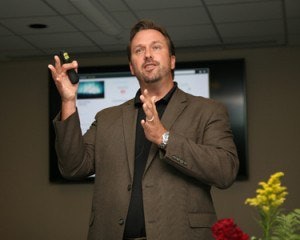Higher education is in the midst of change, with many schools under pressure to recruit and graduate more students, all in a timelier fashion and with streamlined budgets. At the same time, public funding for institutions of higher education is in a state of decline, creating a high-stakes situation for schools across the country.
 Dr. Mark Milliron is co-founder and chief learning officer of Civitas Learning.
Dr. Mark Milliron is co-founder and chief learning officer of Civitas Learning.“We’re in a world in higher education where the pressure is on,” said Dr. Mark Milliron, co-founder and chief learning officer of Civitas Learning. “Expectations are higher, and people are now turning on the lights with new kinds of data that are really in some ways challenging long-held assumptions.”
Milliron was speaking at a panel on accreditation at the annual Society for College and University Planning (SCUP) conference on Monday.
Accrediting agencies, the organizations tasked with ensuring institutional compliance with federal regulations, occupy a unique space in the higher education landscape as the intermediaries between the federal government and schools. As colleges and universities evolve with the times, accreditation is sometimes seen as a constraining factor in terms of their ability to innovate.
Yet innovation and accreditation do not have to be at odds, Dr. Barbara Gellman-Danley, president of the Higher Learning Commission (HLC), said at Monday’s panel. Instead, accreditation can be a catalyst for innovation — albeit with a few caveats.
“Innovation for innovation’s sake is not what I’m talking about,” Gellman-Danley said. “Innovation for the purpose of actually moving … a planned, strategic, comprehensive agenda forward is very possible.”
The panel featured Gellman-Danley, along with Dr. Belle S. Wheelan, president of the Southern Association of Colleges and Schools (SACS); and Dr. Elizbeth H. Sibolskai, president of the Middle States Commission on Higher Education (MSCHE). Collectively, SACS, HLC and MSCHE represent a wide range of institutions across the United States, from community and tribal colleges to private schools.
“We do try to manage things with institutions to be able to incorporate innovations and not stand in your way,” Sibolski said. “Sometimes it may feel that we’re standing in your way, but that may have more to do with what the federal regulations require us to do.”
Data collection and self-study both play a critical role in helping institutions understand their overall effectiveness. Too often, however, schools might wait until the conclusion of a particular academic program or initiative before the process of self-examination begins.
“We’ve got a lot of ‘autopsy’ data… and we don’t really come back to thinking about what it is that can tell us about an institution or a program along the way,” Sibolski said.
To be more effective, schools should consider developing frameworks to measure the success of programs as they unfold, panelists said. That way, they can use research and data to shape programs that serve students’ needs better, in real time.
“It takes a lot of courage, in some ways, to turn the lights on and figure out what’s working and what’s not,” Milliron said.
Some schools, panelists acknowledged, face a very real obstacle in terms of their resources. As a result, they might not be able to invest in institutional research to the same degree that their larger or better-resourced peers can.
“Their research person [might be] a half-time researcher, half-time faculty member and so the challenge we have is helping them understand is that while you may have those limited resources they are still things that you can do with the data that you do have,” Wheelan said.
Ideally, schools should approach accreditation not as a “painful thing you have to do every so many years,” Gellman-Danley said. Instead, it can be a meaningful opportunity for self-study that, when incorporated into the functioning of the institution holistically, offers the school a real possibility for improvement and growth.
“As accreditors, we are trying to be there to facilitate, and to work with you to improve institutions. [That] kind of gets lost in the policing that we have to do,” Sibolski said.
Staff writer Catherine Morris can be reached at [email protected].


















